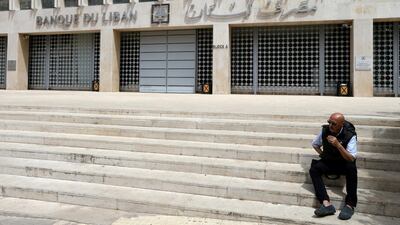The fiscal goals set by Lebanon's government, which is vying to push through its 2019 budget this week, will help one of the world's most indebted countries to reduce its ballooning public debt, spur economic growth and reduce the fiscal deficit.
"Our projections show that the fiscal deficit could narrow from 11.2 per cent of the gross domestic product in 2018 to 8.4 per cent in 2019 and 1.2 per cent by 2023," Garbis Iradian, chief economist for the Middle East and North Africa at the Institute of International Finance (IIF) said in the latest report on Lebanon.
With the reduction in fiscal deficit, the public debt-to-GDP ratio, around 150 per cent now, will be "placed on a firm downward trajectory", declining to 130 per cent by 2023, he added. Bleak forecasts had projected the debt-to-GDP ratio to surge to 180 per cent if structural reforms are not implemented. Lebanon is behind only the most highly indebted countries such as Japan, Greece, Sudan and Venezuela.
Lebanon amassed its public debt, which currently stands at $86.2 billion (Dh316bn), after the end of its 15-year civil war in 1990 as the country rebuilt its devastated infrastructure. Subsequent skirmishes, a war with Israel and various junctures of internal political bickering that left the country without a president or government for prolonged periods over the past decade, also delayed much needed structural reforms.
One of the key steps to Lebanon's recovery will be exploring "serious revenue-enhancing measures", accompanied by significant cuts in non-productive expenditures, according to the IIF. Reforming the wage bill to minimise the negative impact on poorer segments of the population and restructuring the utility company Electricite du Liban, which has been bleeding funds and raising tax revenues, should be the priorities for policymakers. The electricity company costs the government more than $2bn a year in subsidies.
Prime Minister Saad Hariri’s government is on the cusp of pushing through a contentious austerity budget for 2019 that has been lambasted by civil servants, pensioners and employees of the central bank amid fears of salary cuts.
Access to about $11bn of concessional loans from friendly nations, which is contingent on the implementation of fiscal and structural reforms, is critical for Lebanon's economy and its ability to revive growth. These funds will help change the debt dynamics and would also contribute to higher growth and lower interest rates, the IIF said.
For every one-percentage point increase in growth, the public debt-to-GDP ratio would decline by 1.5 per cent a year, according to IIF estimates. A reduction in the interest rate on debt by one percentage point would decrease the debt-to-GDP ratio by 1.4 per cent a year.
“In the absence of meaningful adjustment and external support, Lebanon would remain in a vicious cycle of rising debt, high interest rates, depressed private investment and subdued growth,” said Mr Iradian.
If the intended reforms are not carried out as planned, Lebanon’s fiscal deficit would remain above 11 per cent of GDP, and the debt-to-GDP ratio would increase further to 180 per cent by 2023, which would threaten the stability of the exchange rate.
Addressing corruption and improving governance should be the essential components of fiscal and structural reforms,” said Mr Iradian.
However, fighting corruption is likely to be a gradual process requiring strong political will and can bring substantial fiscal benefits, including lower revenue leakage, less waste in expenditures and a higher quality of infrastructure, he said.


